Dev Diary №22: Unveiling Global Markets and Extended Overview of Colonists
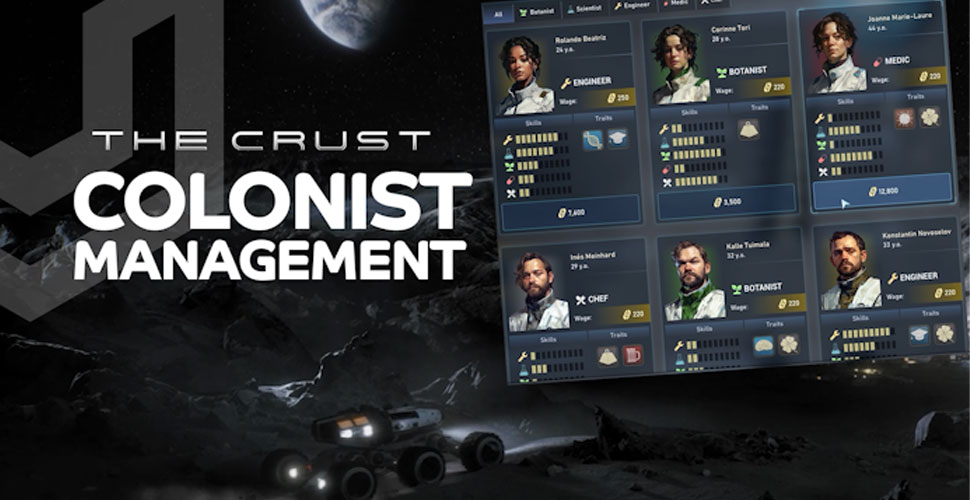
Reaching New Heights: Unveiling Global Markets and Extended Overview of Colonists
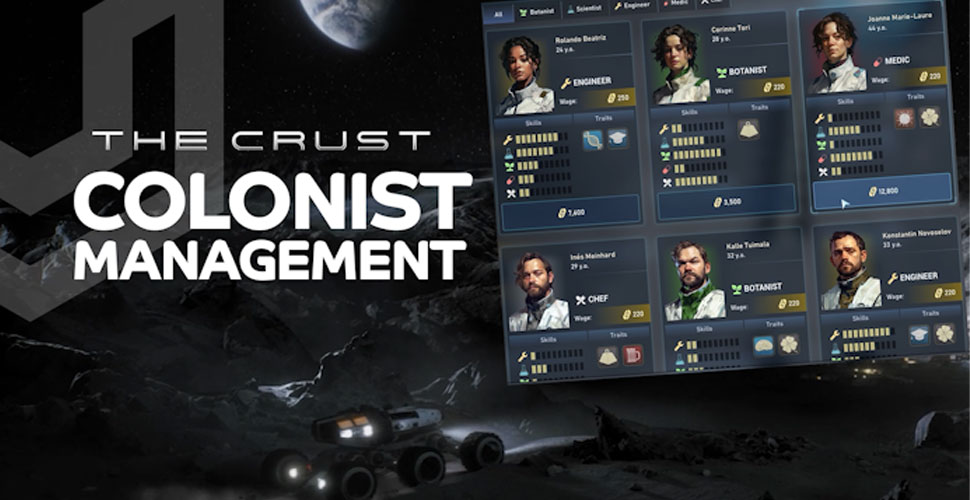
Hello everyone,
We just reached another stretch goal, which will allow us to expand the story and bring more variety and interesting moments to the game. Thank you all for your amazing support, and we can't wait to showcase everything that we have prepared for you.
Today, we would like to delve deeper into colonist management and the global market system, both of which intertwine seamlessly. While we covered some information about colonists in our previous update, today we aim to provide a more comprehensive understanding of this system alongside the Global Market system and how they synergize. We hope you will enjoy what is forthcoming, and as always, we eagerly await your thoughts. Feel free to share your opinions in the comments about these systems and whether you're excited to experience them in the game!
Lets Begin!
As mentioned in our previous update, colonists are one of the cornerstone mechanics within The Crust. They emerge as pivotal entities once the initial base and life support systems are in place. Integral to the game's progression, colonists serve as indispensable catalysts for generating high-tech resources and navigating the intricate branches of the technology tree. Beyond their vital role in resource production, colonists actively engage in expeditions and undertake pivotal tasks across the global map. Their pervasive involvement across all facets of gameplay enriches the experience with a nuanced layer of diversity and depth.
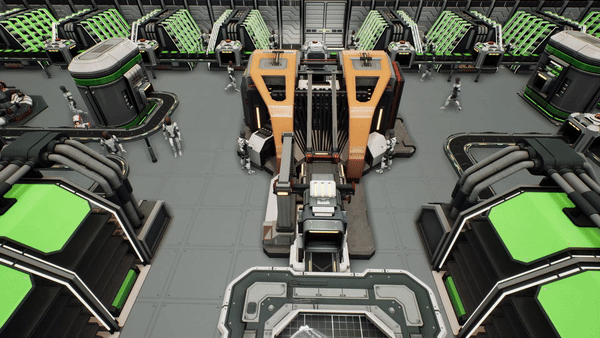
Colonists Skills
Colonists possess a diverse array of skills, unique traits, and essential needs, all of which demand your careful attention to ensure optimal team efficiency.
In the game, there are five core skills: Scientist, Medic, Engineer, Botanist, and Service Worker. The level of proficiency in each skill determines a colonist's effectiveness within their designated profession.
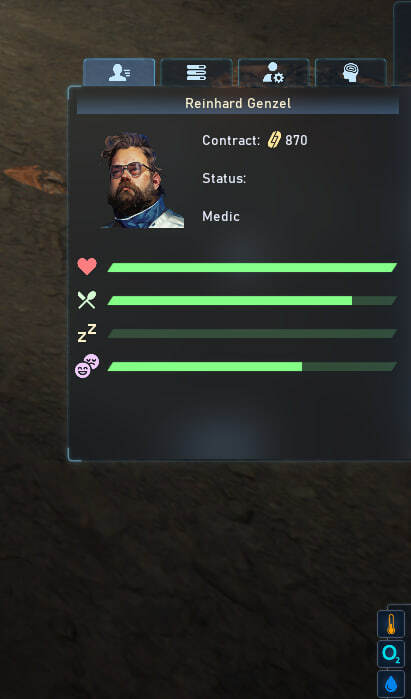
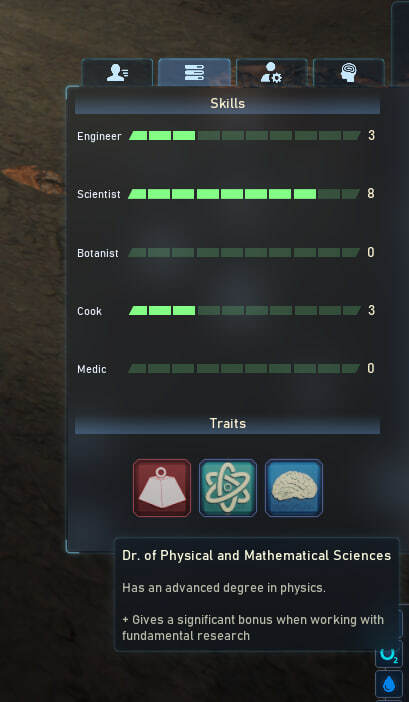
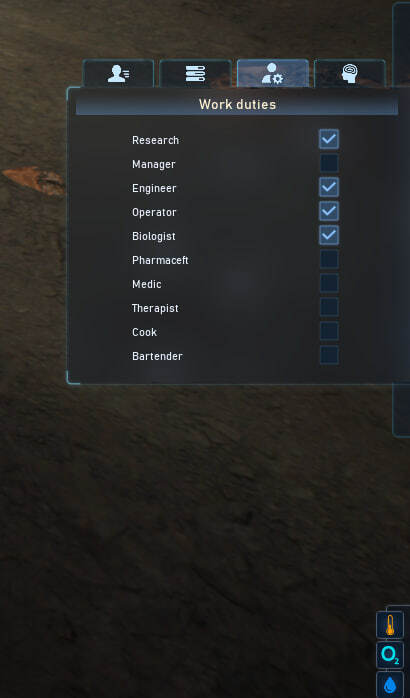
Each skill has 10 levels and increases in several ways - direct work, training and sharing experience. Thus, while working in any profession increases the level of skill corresponding to it. In addition, the game has training centers and the ability to send colonists to other locations on the moon to share experience. For example, you can gather an expedition with scientists and send them to the research station of a neighboring faction. This will block the scientists for a while, but will give a noticeable increase in skill level. Also, during training, colonists have a small chance of acquiring a special perk that gives special bonuses (or penalties). Some factions will charge money for training.
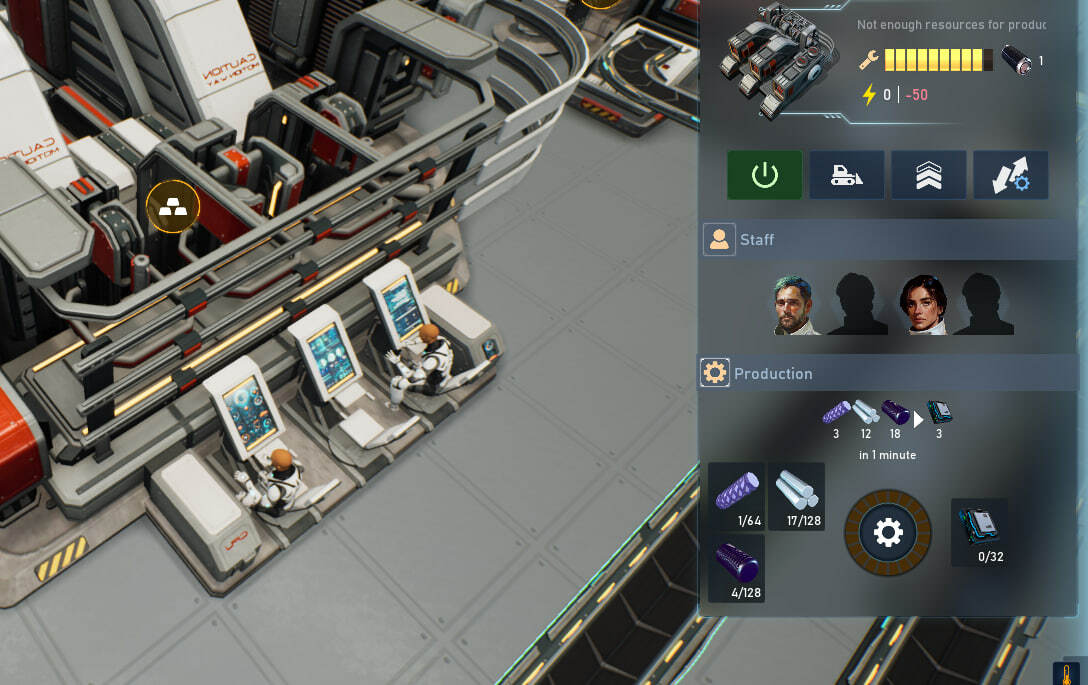
These skills correspond to a variety of activities within the game:
- The Researcher operates in scientific modules and contributes to research expeditions.
- Dispatchers manage operations in the expedition center, coordinating mining units on the global map to enhance their productivity.
- Engineers - are essential for the production of high-tech resources, overseeing construction processes and maintaining vital equipment like the 3D printer.
- Operators - specialize in optimizing medium-tier production modules and are also involved in megastructure operations.
- Botanists - отвечает за производство лекарств
- Pharmacists - oversee drug production.
- Medics provide crucial medical care in the medical block, attending to injured and ill colonists.
- Psychologists monitor the team's psychological well-being, mitigating the risk of colonist breakdowns.
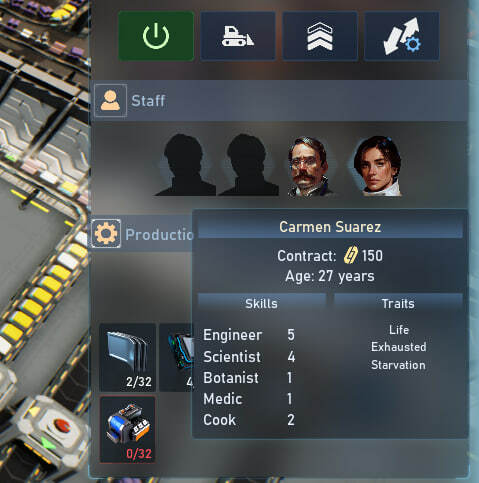
Consequently, a distinguished Scientist excels in scientific endeavors, while an experienced Engineer significantly boosts the output of the production modules they oversee.
Colonists Traits
In addition to the Skills, colonists boast an array of distinctive traits that intricately shape gameplay dynamics. These traits, ranging from personality quirks to specialized expertise, significantly influence various aspects of colony management.
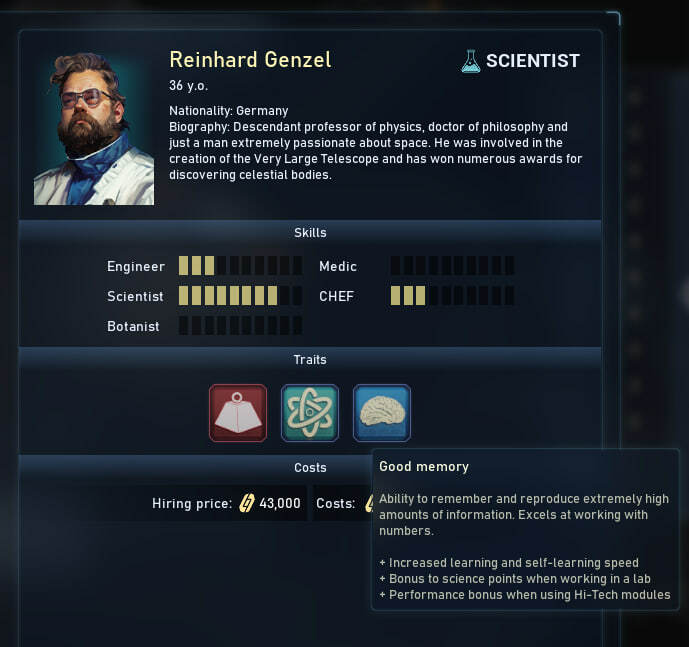
- Work Ethic: Traits such as Lazy or Workaholic directly impact productivity, with Lazy colonists reducing efficiency while Workaholics increase it. These contrasting work ethics will present you with strategic challenges in maximizing output while managing colonist morale.
- Social Dynamics: The disposition of colonists towards teamwork is another crucial factor. A Team Player fosters positive work environments, boosting team cohesion and performance, whereas an Asocial colonist may disrupt harmony, necessitating additional attention to maintain productivity amidst interpersonal challenges.
- Educational Background: Academic achievements also play a pivotal role, with a scientist's academic degree in a specific field providing bonus science points corresponding to their expertise. Leveraging these educational qualifications strategically enhances research endeavors and technological advancements, offering a competitive edge in scientific pursuits.
- Specialized Proficiencies: Some traits, such as Space Elevator Operator or Jekyll and Hyde, offer unique abilities or challenges tailored to individual colonists. These specialized proficiencies introduce captivating narratives and gameplay mechanics, enriching the experience with unforeseen opportunities and obstacles.
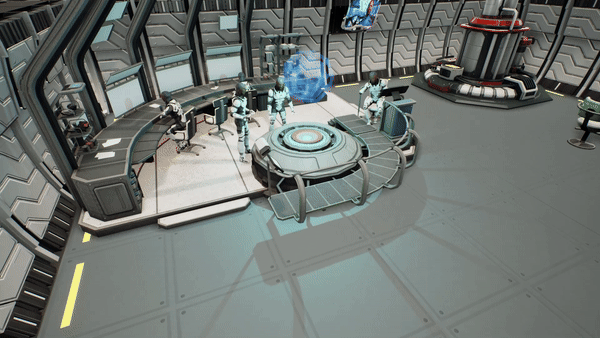
In essence, these diverse traits not only imbue colonists with depth and individuality but also pose strategic considerations for you as you navigate the complexities of lunar colonization. Understanding and leveraging these traits effectively are key to fostering a thriving and harmonious lunar colony in The Crust.
Temporary Effects
Colonists are also a subject to a dynamic array of temporary effects that dynamically influence their well-being and performance. These effects, manifested through temporary cards, contribute to the ever-evolving narrative and gameplay challenges that you will have to face.
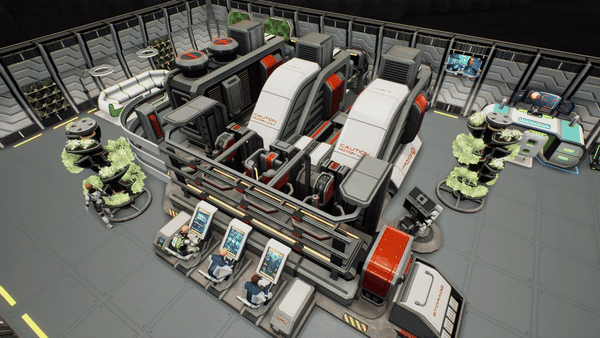
- Emotional States: Colonists experience a spectrum of emotions, ranging from inspiration to distress, which directly impact their morale and productivity. Temporary effects such as inspired, upset, or well-fed reflect fluctuations in emotional well-being, influencing performance in tasks and interactions within the colony.
- Physical Conditions: Temporary effects also encompass a range of physical ailments and conditions, including illnesses, injuries, and medication side effects. These conditions can arise from various sources, such as workplace accidents, hazardous expeditions, or exposure to environmental hazards like solar flares. Managing colonists' health becomes imperative as they grapple with the consequences of these temporary afflictions.
- Environmental Factors: External events and environmental hazards further contribute to temporary effects experienced by colonists. For instance, radiation sickness resulting from solar flares poses a persistent threat, necessitating proactive measures to mitigate its effects. Conversely, positive stimuli such as bonus payments can instill enthusiasm among colonists, bolstering morale and fostering heightened productivity.
- Narrative Dynamics: The interplay of temporary effects with narrative events adds depth and realism to the gameplay experience. Colonists' responses to challenges and triumphs are dynamically reflected through these temporary effects, enriching the narrative tapestry of lunar colonization.
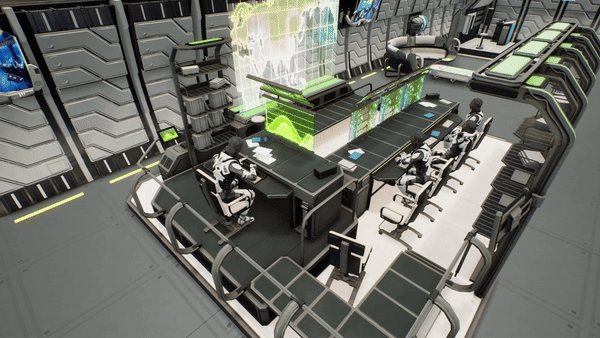
Colonist Needs
Each colonist in the game possesses a set of dynamic parameters crucial for their well-being and productivity. These parameters encompass four fundamental aspects: health, sleep, food, and comfort, alongside hidden psychological states. As the manager of the lunar facility, your primary responsibility is to ensure that these needs are adequately met to maintain the colony's operational efficiency and the colonists' overall welfare.
The challenging conditions inherent to life on the lunar base often result in the accumulation of fatigue and stress among colonists. To alleviate these pressures, it's essential to provide them with opportunities for relaxation, social interaction, and physical activity. Establishing facilities such as gyms, game rooms, or personal cabins can significantly contribute to maintaining colonists' alertness and well-being.

By prioritizing the fulfillment of colonists' basic needs and fostering a supportive environment within the lunar facility, you not only enhance their individual performance but also cultivate a cohesive and resilient community capable of overcoming the rigors of space exploration in The Crust.
Hiring Colonists
Accessing the colonist recruitment market is vital for expanding your lunar colony's workforce, although securing highly skilled specialists can pose a challenge during the early stages of the game. To overcome this hurdle, you must focus on developing your Global Reputation Index (GRI) or fostering relationships with specific factions. These interactions grant access to hiring high-caliber specialists with unique traits tailored to each faction's expertise.
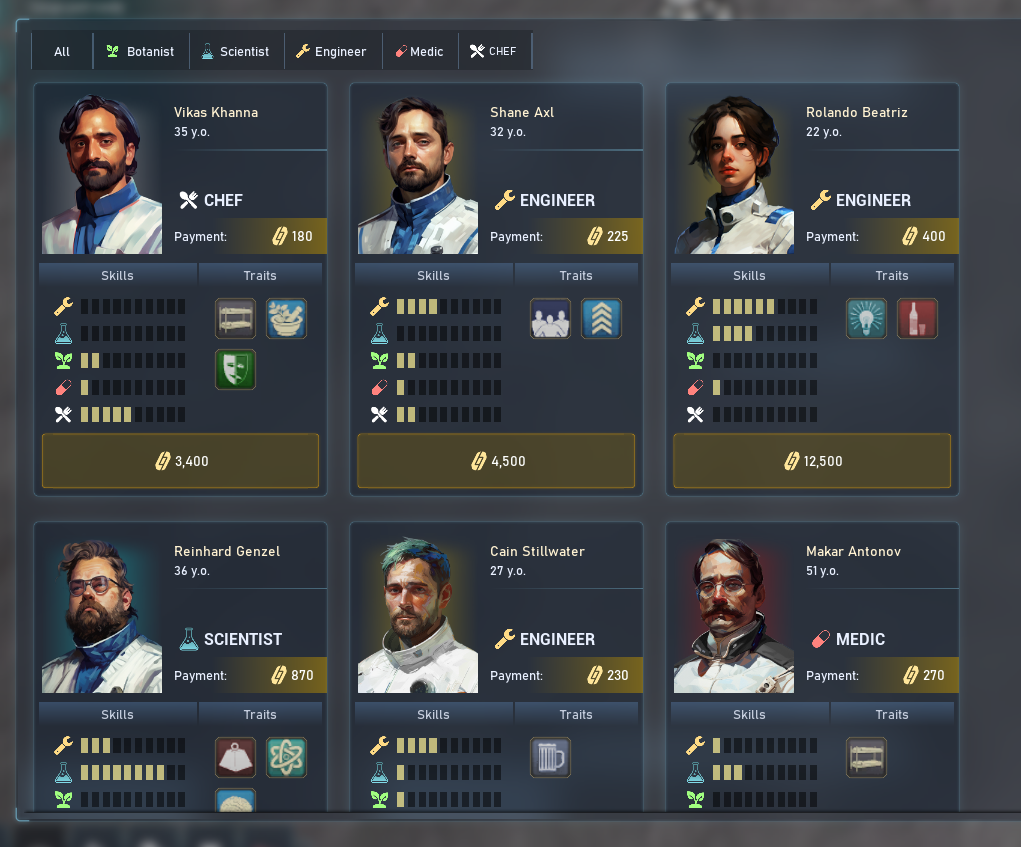
Each faction offers a distinct set of traits for their colonists, obtainable through close interaction and completion of contracts and quests. For instance, specialists from the Arab Construction Consortium excel in optimizing water-producing modules, leveraging their extensive experience. Conversely, colonists affiliated with the Crust organization are seasoned veterans of lunar exploration, adept at navigating expeditionary challenges with resilience and skill.
Furthermore, skills and unique traits play a pivotal role in quest chains and random events, offering alternative development options based on your colonist composition. Much like in Fallout New Vegas, possessing colonists with specific skill levels or unique traits unlocks new decision-making opportunities, enriching gameplay with diverse narrative branches and strategic possibilities.
Overall, our meticulous attention to creating engaging choices extends beyond gameplay mechanics to quest chains and random events. Colonists and their associated mechanics serve as linchpins in this endeavor, enhancing your immersion and strategic depth.
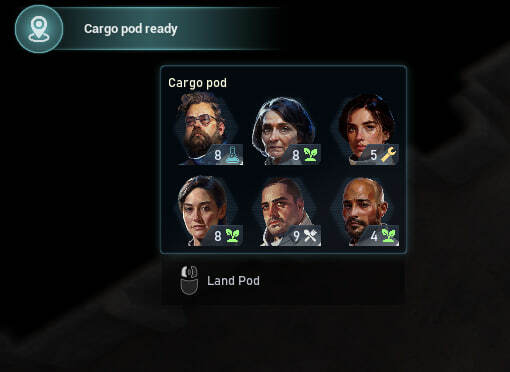
Colonist Management System
The colonist management mechanic is intricately designed to empower you in efficiently distributing colonists among workplaces, ensuring optimal productivity and task alignment. The flexible profession system automatically assigns roles based on colonists' skills but can be tailored to suit your current priorities.
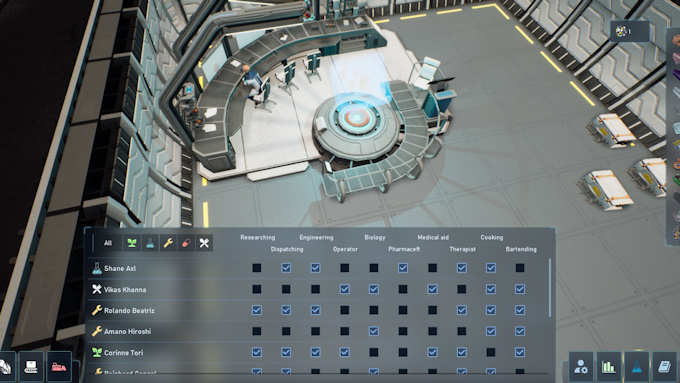
Each colonist can be assigned a priority task, granting you granular control over their deployment according to specific needs. Additionally, we've introduced a new interface for interacting with Laboratories, enabling you to select specialists proficient in various scientific fields, further enhancing strategic decision-making.
As you progress beyond the initial stages of the game, colonist management becomes a primary focus. Ensuring the smooth operation of life support systems, timely wage payments, and addressing health and comfort needs directly impact the productivity of living employees. It's worth noting that higher-skilled colonists command higher costs, mirroring real-world dynamics. Furthermore, each colonist possesses unique quirks and secrets, gradually revealed over time, adding depth and intrigue to the colony's inhabitants.
Global Markets
The Global Market is a dynamic system within the game that reacts to your actions and progress. It's not merely a tool for acquiring what you need and disposing of surplus; it's akin to a living organism that evolves over time.
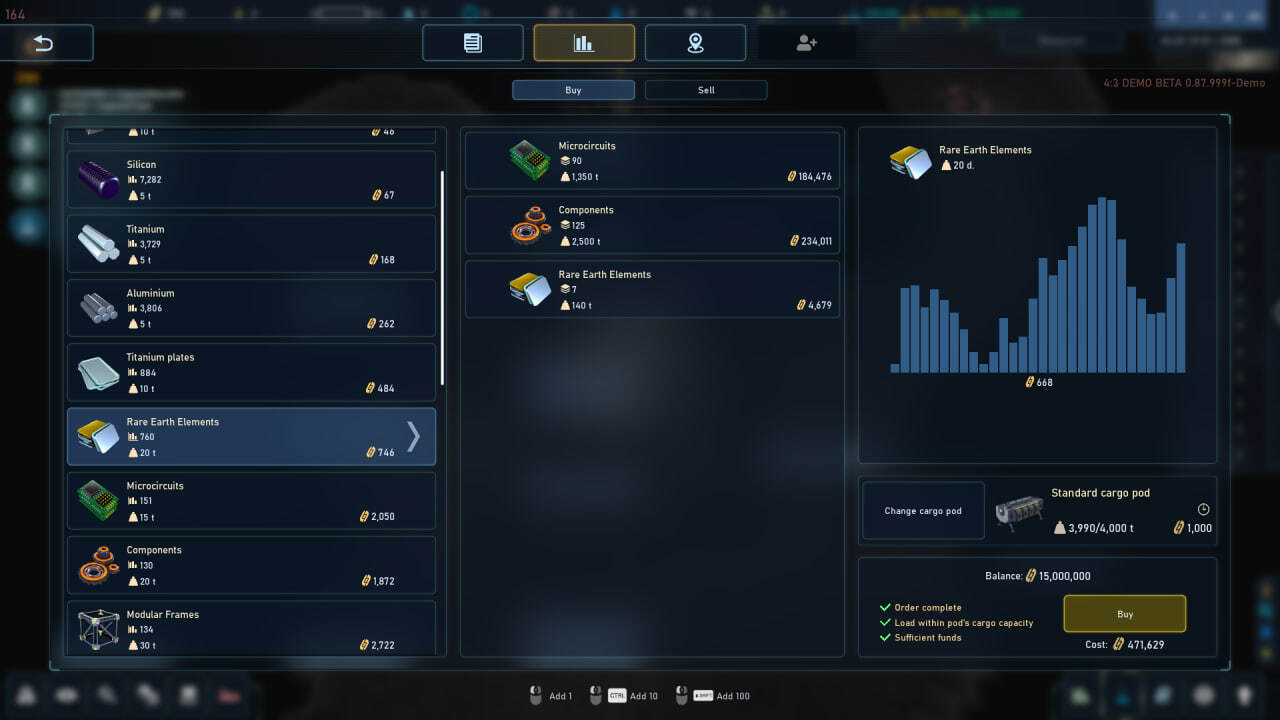
Market prices constantly fluctuate in response to dynamic events worldwide. You can capitalize on a crisis in the high-tech goods market for profitable purchases, or leverage a humanitarian catastrophe to sell your goods lucratively. In addition to in-game events, the market reacts to major purchases and sales made by you or other factions. The laws of supply and demand are fully operational here. Therefore, a significant influx of resources into the market can lead to scarcity and drive prices up, while flooding the market with the same resource can result in price depreciation, minimizing profits.
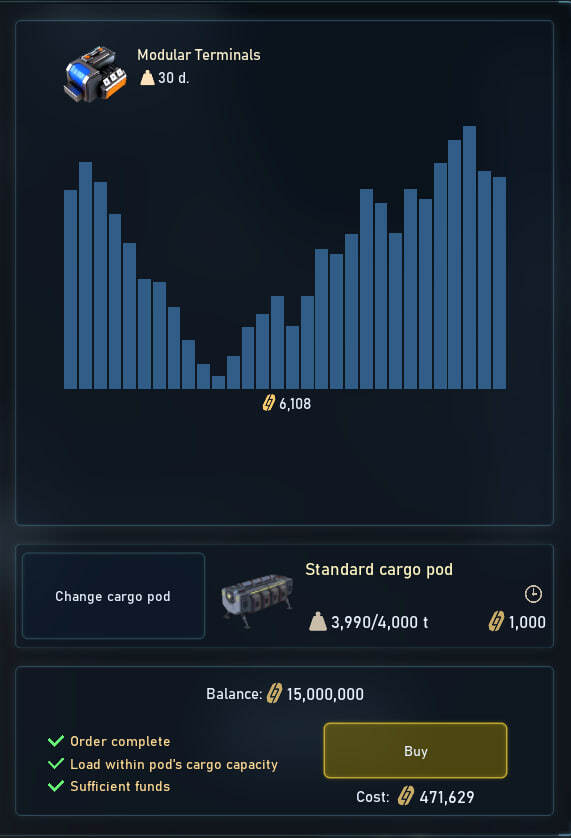
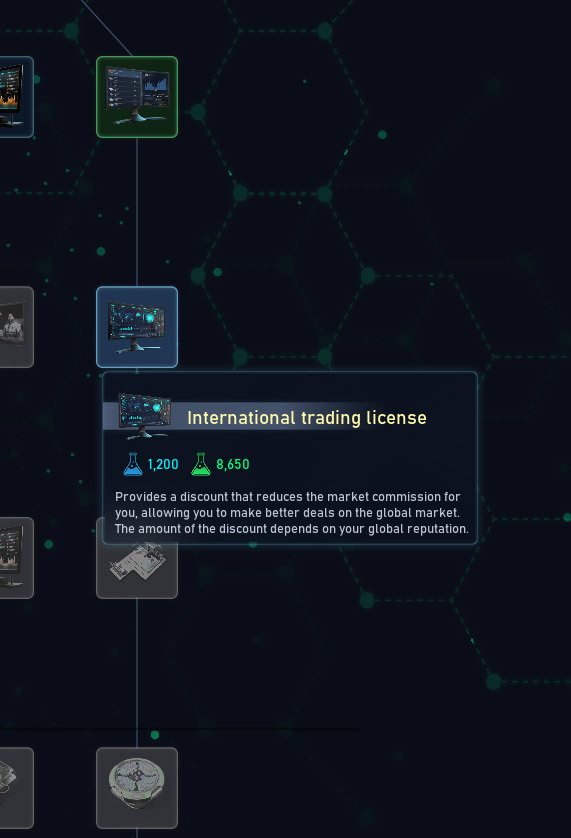
Another influential factor on the global market is the Global Reputation Index (GRI) and expanded trading license. Your GRI value, influenced by completing faction-related tasks and making certain decisions, slightly reduces purchase prices and boosts selling prices. The expanded trading license, attainable through social research, narrows the gap between purchase and selling prices.
As previously mentioned, the Global Market is also where you can hire various colonists. Similar to goods prices, the salaries demanded by colonists depend significantly on the game's current circumstances. Following a catastrophic event on the moon or Earth, securing skilled engineers or medical professionals may be challenging and expensive due to increased demand. Conversely, other specialties may become more affordable. Thus, keeping abreast of global events allows you to time your hiring effectively.
We hope you will enjoy this extensive deep dive into these systems, and as always, if you have any questions, let us know. You can drop your questions in the comments or join our Discord
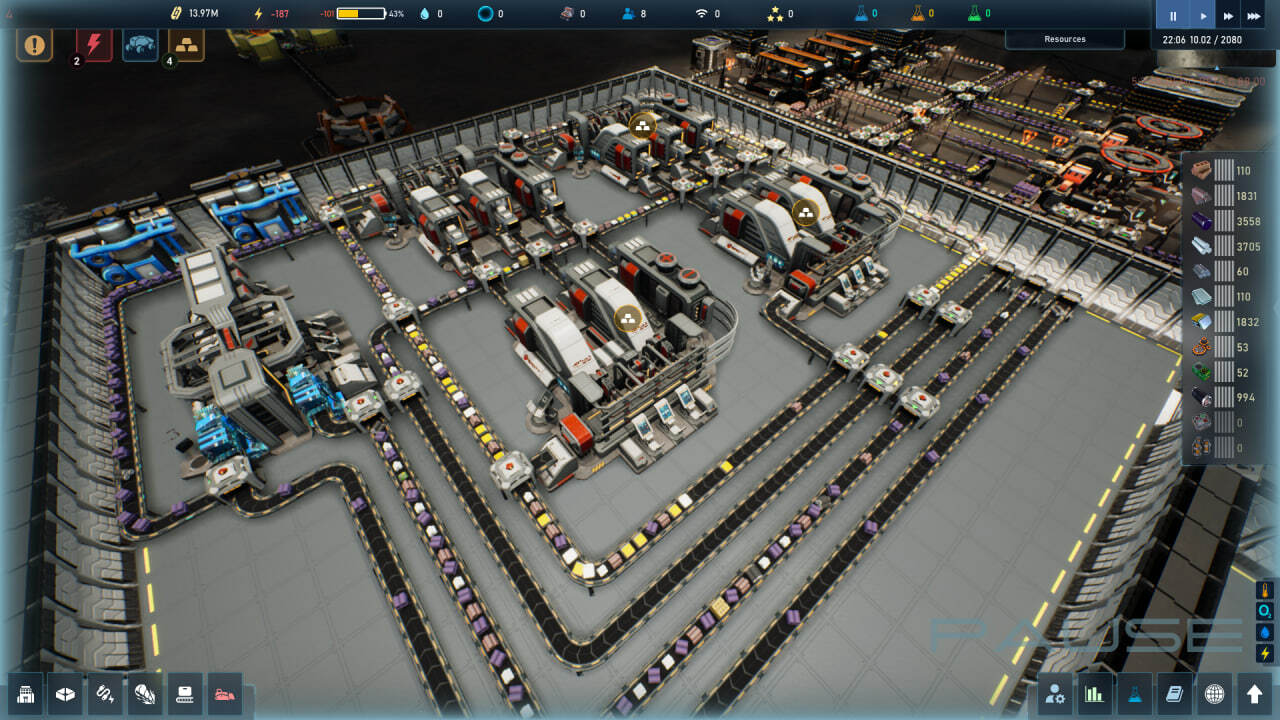
Recent posts
- Dev Diary №22: Unveiling Global Markets and Extended Overview of Colonists
- The Crust Combat System Concept
- Dev diary №21 - Expansion of colonist mechanics, ice and new interfaces
- The Crust live on Kickstarter
- Assembler with jobs for colonists
- DEV DIARY №20 - Optimization, interface and new units.
- Steam Next Fest Results
- The Crust Closed Beta Starts Now!
- New Logo Reveal
- DEV DIARY №19 - STORY LINE, POI AND NEW CONTRACT SYSTEM
- NEW MODULE CONCEPT
- FIRST DEMO ON STEAM BASE BUILDER FEST
- DEV DIARY #18 - Mechanics on the Global Map, Updated Interface, and Logistics Innovations
- DEV DIARY №17 - Conveyors,new visuals and optimization - what's new with The Crust?
- Interview for UE4 Daily
- DEV DIARY №16 - MAKING HISTORY: A LITTLE BIT ABOUT OUR QUESTS
- WOULD YOU FLY TO THE MOON?
- 3D BATTERY MODEL CREATION IN TIME-LAPSE
- DEV DIARY №15 - ABOUT THE UTILITY SYSTEM ON THE LUNAR BASE
- ERASE AND REWIND, OR WHY BREACKING THINGS IN VIDEO GAMES IS AS DIFFICULT AS CREATING THEM
- DEV DIARY №14 - 50 SHADES OF REGOLITH, OR RESOURCE EXTRACTION AND PROCESSING IN THE CRUST
- DEV DIARY №13 - GALACTIC MARKET
- 2021: THE CRUST TRANSFORMS
- DEV DIARY №12 - ROOMS AND WALLS
- DEV DIARY №11 - REFACTORING AND NARRATIVE
- DEV DIARY #10 EXCAVATION VISUALIZATION, REFACTORING AND OVERMIND OPTIMIZATION
- DEV DIARY #9 OPTIMIZATION AND PROCEDURAL GENERATION
- PATCH NOTE 0.72.19
- DEV BLOG 8 - WORKING ON THE SETTING, PART TWO
- PreAlpha Gameplay Trailer
- DEV DIARY №7 - CARGO CAPSULES
- PATCH NOTE 0.63.14
- PATCH NOTE 0.6.09
- DEV DIARY №6 - THE COLONISTS, PART ONE
- DEV DIARY №5 - WORKING ON THE SETTING, PART ONE


